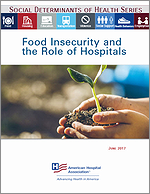AHA guide offers proven hospital approaches to reducing food insecurity

AHA’s Health Research & Educational Trust guide offers hospitals and health systems strategic and evidence-based approaches to reducing food insecurity and its effects in their communities. The inability to afford or access nutritious and safe food has been associated with increased risk for chronic disease and mental illness and poor health self-management. The guide spotlights clinical and non-clinical approaches to reducing food insecurity, such as Arkansas Children’s Hospital’s on-site free lunch program, Boston Medical Center’s Preventive Food Pantry, Eskenazi Health’s partnership with Meals on Wheels, and ProMedica’s food insecurity screening survey. The AHA resource is the first in a new series on the integral role of hospitals in addressing socio-economic factors that contribute to health. Future guides will look at factors such as housing and education.

